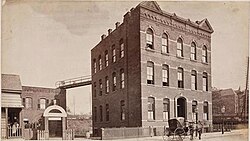The Knickerbocker Hospital[1][2] was a 228-bed hospital[3] in New York City located at 70 Convent Avenue, corner of West 131st Street in Harlem, serving primarily poor and immigrant patients.[4][5]
| Knickerbocker Hospital | |
|---|---|
 The Hospital in 1886, known as J. Hood Wright Memorial Hospital at the time. | |
 | |
| Geography | |
| Location | New York City, New York, United States |
| Coordinates | 40°48′57″N 73°57′11″W / 40.815825°N 73.953000°W |
| Organization | |
| Type | General |
| Services | |
| Beds | 228 |
| History | |
| Former name(s) |
|
| Opened | 1862 |
| Closed | 1979 |
| Links | |
| Lists | Hospitals in New York State |
| Other links | Hospitals in Manhattan |
History edit
Founded in 1862[1] as the Manhattan Dispensary,[6][7] it served as a temporary American Civil War tent facility for returning Union Army invalidsDated/offense?. In 1885, the New York Times praised its rebirth as the fully equipped Manhattan Hospital, "the only general hospital north of Ninety-ninth street." The hospital assumed the city's largest ambulance district for many decades[1] and worked at the forefront of treatments for polio, alcoholism, and gynecological care.
Manhattan Hospital's successive names were:
- the J. Hood Wright Memorial Hospital after James Hood Wright in 1895,
- the Knickerbocker Hospital in 1913,
- and finally, in 1974, as the Arthur C. Logan Memorial Hospital[8] after Arthur C. Logan only a few years before it closed in 1979.[9][4][5]
The 1914 Directory of Social and Health Agencies listed the hospital as such:
- Knickerbocker Hospital (incorp. 1862 as the ManHattan Dispensary; Aug. 1895, title changed to J. Hood Wright Memorial; title again changed to present name, June, 1913, opened 1884), Amsterdam Ave. and 131st St. Gives free medical and surgical treatment to the worthy sick poor of New York City. Incurable and contagious diseases and alcoholic, maternity and insane patients not admitted. Emergency cases received at any hour. Capacity, 57 beds. 1,090 cases treated and 1,540 days' treatment given during the past year. Dispensary free to the poor only. Supported by charitable contributions. Visiting days, Tuesdays, Fridays and Sundays from 2 to 4 p.m.
- Ambulance Service for the district from West 76th St. to 145th St. and from St. Nicholas Ave. to North River, including 28th, 32d and 36th Police Precincts.
- Officers: Macomb G. Foster, Pres.; William H. Remick, Biv. 1. General Hospitals. 189
- Treas.; Grant Squires, Ass't Treas.; Edward D. Jones, Sec.; Lucy M. Moore, Supt., to whom apply at hospital.[5]
Current status edit
The former Knickerbocker Hospital building still stands and is currently the M. Moran Weston[10] seniors' residence.[11][12][13]
In popular culture edit
The television series The Knick is set in a hospital inspired by the Knickerbocker.[4] The Knickerbocker, similar to the television portrayal, had a standing policy often refusing to treat African-American patients despite the hospital's mission to serve those who could not afford to pay for medical care. The building was not used in the show's production, with the Boys High School building standing in for the hospital instead.[14] In the television series, Clive Owen's character, Dr. John Thackery, is based in part on Dr. William Stewart Halsted. Dr. Halsted, a well known physician who invented many new surgical instruments and techniques in the early 20th century was, according to the Johns Hopkins Institute, known to be addicted to cocaine and morphine, like "Thackery."[15]
See also edit
- Doris L. Wethers, director of pediatrics at Knickerbocker Hospital from 1965 to 1973
- William Stewart Halsted, physician and inventor.
References edit
- ^ a b c C. Gerald Fraser (December 4, 1971). "Knickerbocker Hospital Says Debts May Force It to Close". The New York Times.
- ^ "1,000 ALCOHOLICS AIDED; Knickerbocker Hospital Shows Wider Services in 1953". The New York Times. May 9, 1954.
- ^ "City and State Seek to Aid Knickerbocker Hospital". The New York Times. November 24, 1972.
- ^ a b c "Knickerbocker Hospital: An inspiration for Cinemax's The Knick". The Bowery Boys. Retrieved August 13, 2014.
- ^ a b c Miller, Lin (1914). "Directory of Social and Health Agencies of New York City". New York Charities Directory. 21. Columbia University Press: 188. Retrieved August 24, 2014.
- ^ "St. Valentine's Market: A Fair for the benefit of Mahattan Dispensor". The New York Times. February 5, 1989.
- ^ address: 503 West 131st Street
- ^ Judith Cummings (April 14, 1978). "Harlem's Logan Hospital Struggles On". The New York Times.
- ^ "Knickerbocker Now A.C. Logan Hospital". The New York Times. February 5, 1974.
- ^ Douglas Martin (May 22, 2002). "M. Moran Weston, 91, Priest and Banker of Harlem, Dies". The New York Times.
built housing for thousands .. a community center and a nursing home housing for the elderly and the mentally ill
- ^ "Secretary Cuomo's Remarks at the Columbia University Moran Weston Lecture Series". September 12, 2000.
Dr. Weston took a hospital, Knickerbocker Hospital, and remade it into housing. This was unheard of at that time.
- ^ "McGuire, James C. : Guides to Institute Records".
Knickerbocker Hospital in New York City ... is now the M. Moran Weston Seniors' Residence.
- ^ "The Old Knickerbocker Hospital". The New York Times.
- ^ "NYC Film Locations for Steven Soderbergh's The Knick". Untapped New York. October 15, 2014. Retrieved February 13, 2021.
- ^ Jennifer Schuessler (August 1, 2014). "The Cocaine, the Blood, the Body Count". The New York Times.